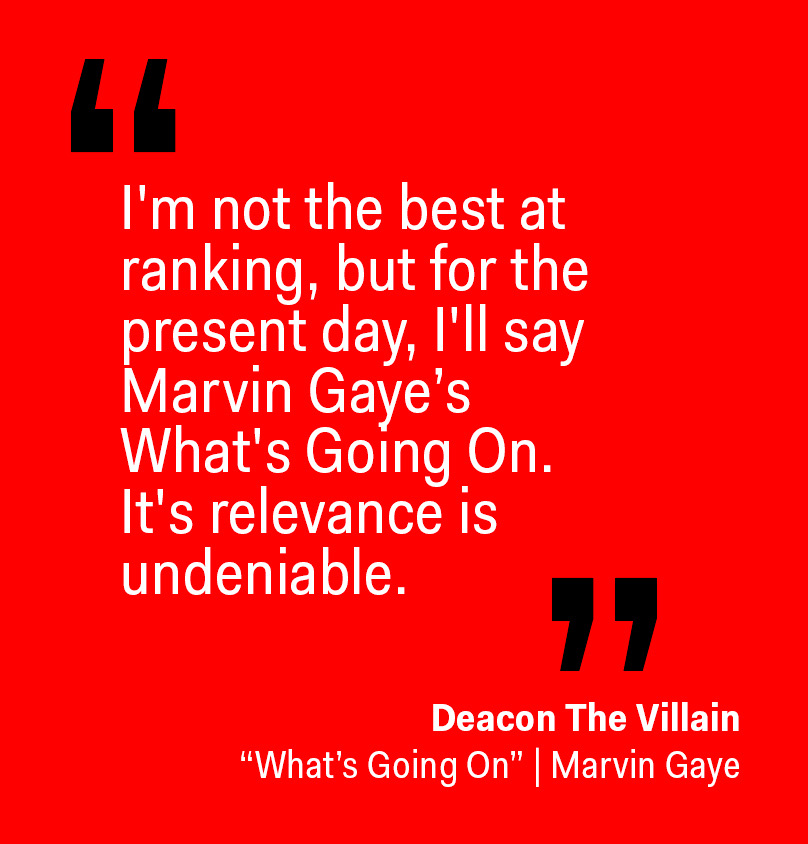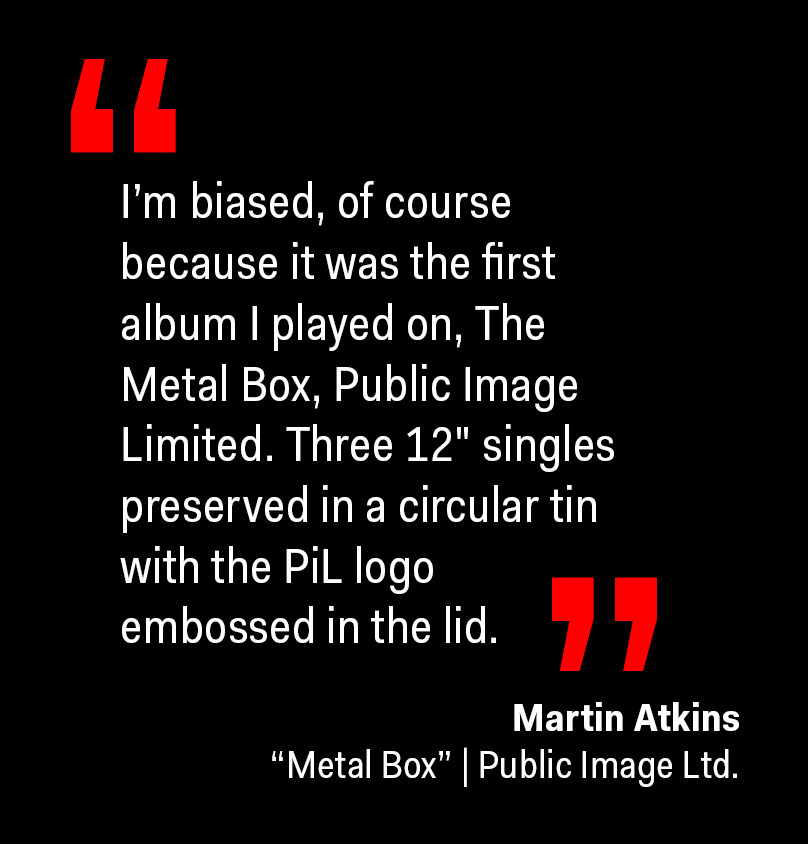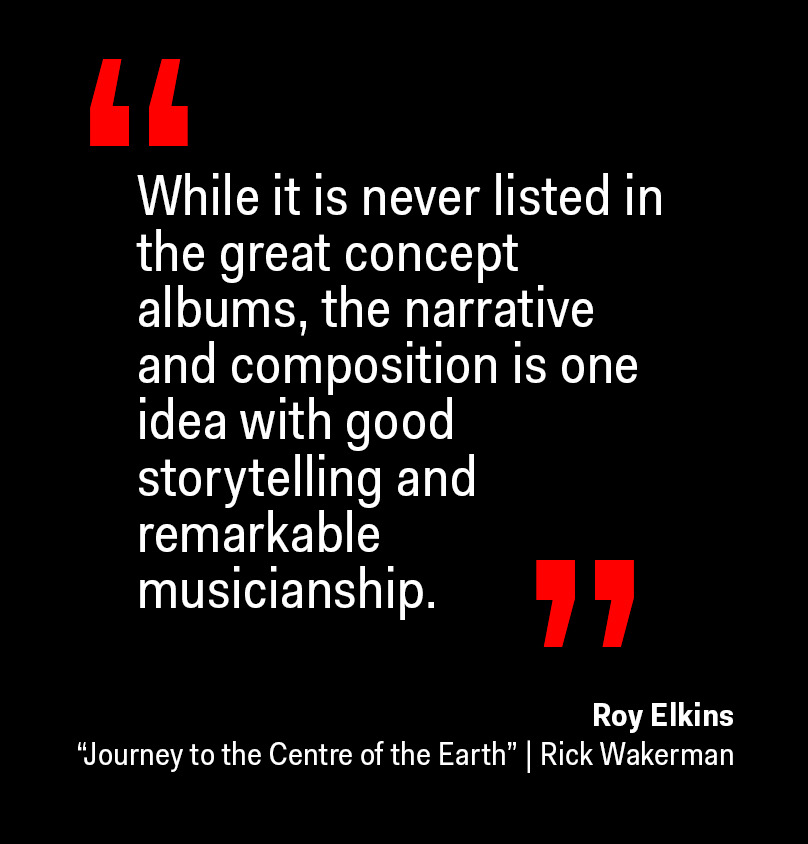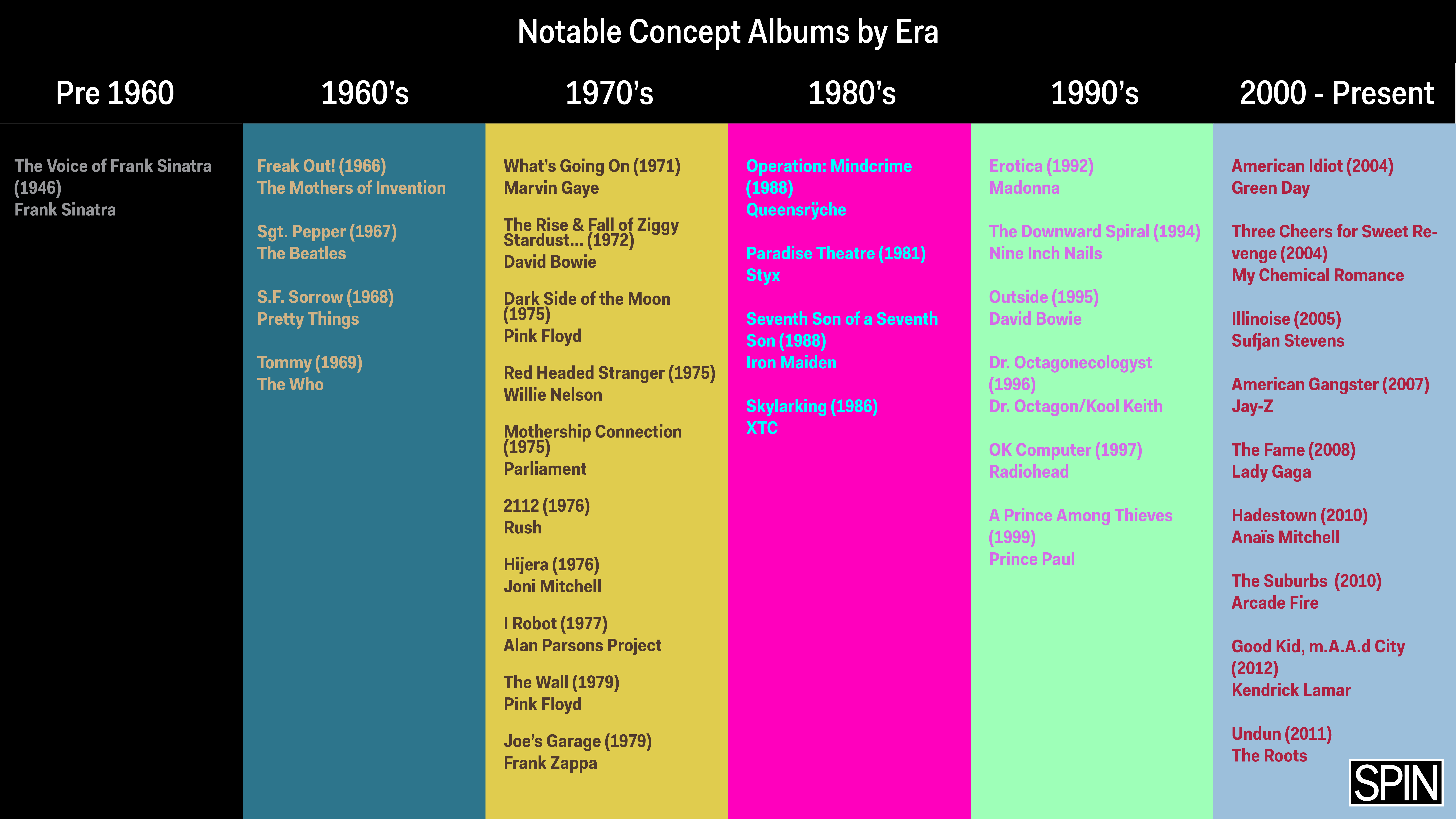
Music in general is too rarely inspirational. It has too often become the white noise we shove into the background as we scan social media feeds. If music is a savior that pulls us together, we’ll need to embrace the resurrection of the almighty concept album. They fill in the small pixels that complete the big picture, and sometimes inspire other musicians to elevate their game.
If you said Sgt. Pepper’s Lonely Hearts Club Band by The Beatles, you are wrong. But you may also be right. That’s because the term “concept album” is rather ambiguous. In its most generic form, it’s an album where all the songs adhere to a certain theme or concept. The purists, however, will tell you that it maintains a cohesive theme via a narrative of some sort. Hip hop artist Deacon The Villain describes them as “movie soundtracks without the movie.”
Deacon has been a part of no less than five conceptual releases including the critically acclaimed A Piece of Strange by CunninLynguists and more recently Couple’s Skate by his crew The Off Daze. According to Deacon, “As long as you can thread all the songs on an album together and have them touch on or expound upon a solitary theme, in my opinion, you have a concept album.”
There are albums that are considered concept albums that have gotten a pass based solely on band fame. Pet Sounds by The Beach Boys falls into this category, cited solely based on Brian Wilson’s genre-bending heavily orchestrated production style.
There are also albums that may not stick to the narrative portion, but do a solid job maintaining a specific theme: Fleetwood Mac’s Rumours for instance. You won’t find Rumours on “best of” concept album lists, but the theme of toxic relationships—and their effect on the individuals involved—is sewn into the album’s fabric.
So what’s so special about the concept album? Broadjam CEO and The MAMAs founder Roy Elkins paints a familiar picture: “You find yourself sitting on a giant bean bag with headphones on, a black light shining, incense burning, a double album in your lap, contemplating the incredible artwork of Roger Dean while hearing “The Fish” and “Mood For A Day” back-to-back on side two. This is why these albums reverberate with fans. One song leads to another and before you know it, you have listened to the entire collection.”
Alan Parsons, who built an entire career off the concept album, got his start as an audio engineer at Abbey Road Studios, running the board during sessions for The Beatles’ Abbey Road and Pink Floyd’s Dark Side of the Moon — the latter stayed on the Billboard album chart for an astonishing 741 weeks from 1973 to 1988. Pink Floyd took the narrative concept further by transforming The Wall, a bona fide concept album, into a visual concert experience. The critical response to the album’s 1979 release was initially lukewarm, but the insane concert extravaganza and a later film adaptation propelled it to the top of the Billboard charts for an astonishing 15 straight weeks.
But without Pete Townshend and The Who’s groundbreaking “rock opera” Tommy, it’s possible The Wall wouldn’t exist. Tommy was an ambitious project that startled the music industry in 1969 and became the first album to successfully blend exceptional storytelling with advanced production. Had it failed, the true concept album may have died with it. Instead, this musical narrative about the deaf, dumb, and blind boy expanded the, er, concept of what an album could do.
In an interview with the New York Post in 2019, Roger Daltrey affirmed Tommy’s influence. “It obviously hit a nerve with the youth of America, that’s for sure, or the youth all over the world. And I think that had a lot to do with the Cold War at the time. Obviously, in America, you had the Vietnam War. That was a generation fighting for its identification and fighting for its spiritual path.”
The concept album has not vanished, but it’s teetering on the endangered species list. Drummer, promoter and label owner (Invisible Records, Mattress Factory Studios) Martin Atkins has witnessed its disappearance from all sides of the industry. “Album sales in general have dropped,” says Atkins. “It’s difficult to elaborate on a theme digitally. There are so many other distractions and reasons to click somewhere else. Also, musical theater has siphoned some of that energy.”
Concept albums require a great deal of effort. It’s tough to construct a thematic full-length record when labels are pushing for new content and promoting streams.
“With a click of a button, we have become an instant gratification society,” noted Roy Elkins. “All the distractions in today’s world make it trickier for the artists to deliver reflective records that inspire the listener to absorb an entire album over and over again. In the past, the listener’s voyage to discover anything new, took energy and adventure. Sometimes that exploration traversed another fork in the road and directed us to something greater than we were seeking in the first place. In today’s world, the immediate joy of the single is adequate pleasure, and side two is never reached.”
Streaming services have threatened the survival of theme-based albums. We’ve obliterated radio DJs and replaced them with Alexa and “Hey, Google!” Fans can create their own playlists, or choose one hand-selected by the streaming services that control the content. Biased much?
We’ve also somehow managed to regress in the audio/sound arena despite extensive technological advancements. High-quality stereo speakers have been replaced with mono tubes shoved between toaster ovens and coffee pots. The end result is a sea of zombie consumers who have grown accustomed to free music, and artists/labels who can’t justify the expense of writing, tracking and promoting elaborate albums with slight nuances the average listener doesn’t give a shit about.
These days, the concept album rarely surfaces as an initial release, and usually only appears in an artist’s catalog after strong fan recognition. Very few artists have produced concept albums in the 21st century, and almost all of them had a decent buzz prior to release.
A few examples: American Idiot by Green Day, American Gangster by Jay-Z, Three Cheers for Sweet Revenge and The Black Parade by My Chemical Romance, Undun by The Roots, The Downward Spiral and Year Zero by Nine Inch Nails, Illinoise by Sufjan Stevens.
Beyonce has been on a concept kick lately, starting with Lemonade in 2016 and more recently The Lion King: The Gift and its visual companion Black Is King. But other than a couple Kendrick Lamar albums (Good Kid, m.A.A.d. City and To Pimp A Butterfly), we haven’t seen much action in the concept album department since 2010, no matter how loose we allow the definition.
Currently, most musicians have been stuck indoors with plenty of time to reflect on the divisiveness in this country which has reached catastrophic proportions. We may hear some mind-blowing music in the next couple of years, and we may desperately need it. And it’s no different than those albums released in the ‘60s and ‘70s, when musical experimentation brought America together. Thought-provoking music has always been a beacon of hope during dark times, and the concept album has on occasion been its flagship — an example of art’s unifying potential and controlled rage.








Leave a comment